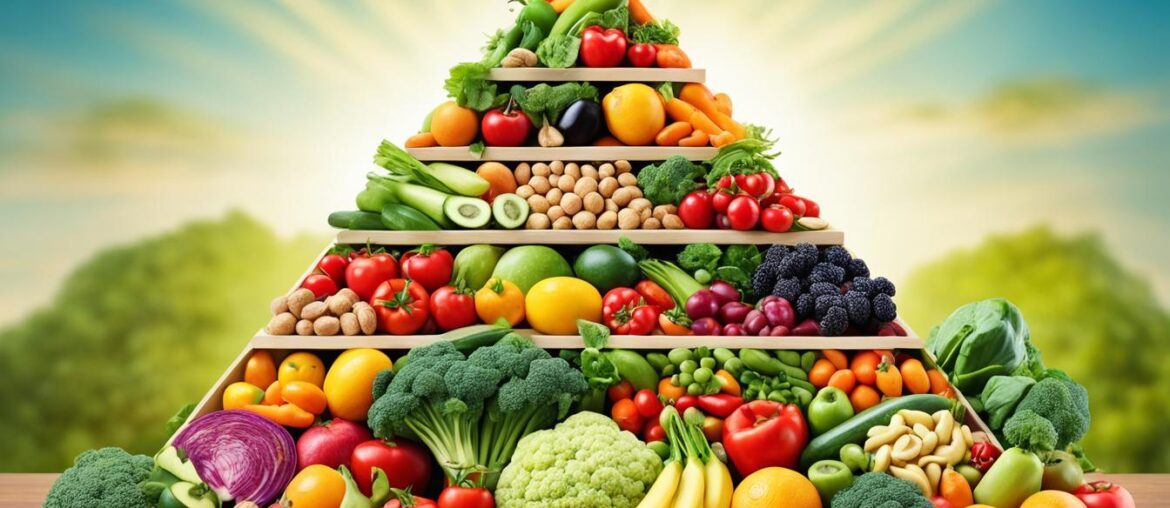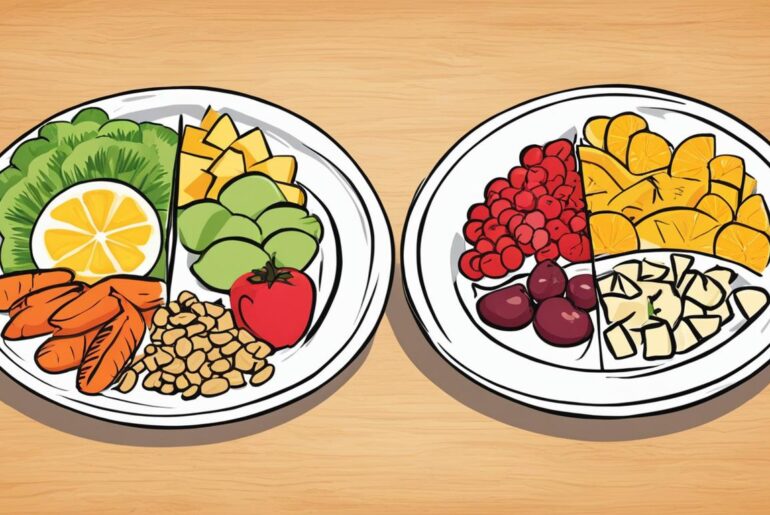The debate surrounding the use of organic food for weight loss has gained attention in recent years. While some may argue that organic food is overhyped and expensive, there are several benefits that make it worth considering for weight loss. Organic food provides more nutrition with fewer pesticides, is rich in fiber content, includes healthy carbohydrates, is high in antioxidants, and helps balance hormone levels. Incorporating organic food into a weight loss diet can have a positive impact on overall health and wellness.
Key Takeaways:
- Organic food offers more nutrition with fewer pesticides.
- Organic food is rich in fiber content and includes healthy carbohydrates.
- Organic food is high in antioxidants, which are beneficial for weight loss.
- Choosing organic options helps balance hormone levels.
- Incorporating organic food into a weight loss diet can have a positive impact on overall health and wellness.
The Nutritional Benefits of Organic Food for Weight Loss
Organic food offers numerous nutritional benefits that can support weight loss efforts. When it comes to weight management, the quality of the food we consume is just as important as the quantity. Organic food, cultivated without the use of synthetic fertilizers and pesticides, is known for its higher nutritional content compared to conventionally grown produce.
The Power of Essential Nutrients
Organic food is rich in essential nutrients that are crucial for weight loss. It contains higher levels of minerals like zinc and magnesium, which play a vital role in regulating metabolism and promoting fat burning. Omega-3 fats, commonly found in organic meat and dairy products, can also aid in reducing inflammation and supporting healthy weight loss.
The higher nutritional value of organic food can be attributed to the fact that organic crops are grown in healthier soil. This nurtures the plants and provides them with a more diverse range of nutrients, resulting in produce that is packed with vitamins, minerals, and antioxidants.
Fiber: The Key to Feeling Full
One of the significant benefits of incorporating organic food into a weight loss diet is its high fiber content. Fiber is known for its ability to promote satiety and reduce overeating. By choosing organic fruits, vegetables, and whole grains, you can increase your fiber intake, helping you feel full for longer periods and reducing the urge to snack or indulge in unhealthy cravings.
Reduced Exposure to Harmful Chemicals
Choosing organic food for weight loss not only provides you with essential nutrients but also helps minimize your exposure to harmful chemicals. Organic agriculture prohibits the use of synthetic pesticides and genetically modified organisms (GMOs), ensuring that the food you consume is grown naturally and without potentially harmful substances. This can contribute to improved overall health and support your weight loss journey by reducing the oxidative stress and inflammation caused by pesticides.
An Overview of the Nutritional Benefits:
| Nutrient | Benefit |
|---|---|
| Zinc | Regulates metabolism and promotes fat burning |
| Magnesium | Supports metabolism and aids in weight loss |
| Omega-3 Fats | Reduces inflammation and supports healthy weight loss |
| Vitamins and Antioxidants | Provides essential nutrients and supports overall health |
| Dietary Fiber | Promotes satiety and reduces overeating |
| Reduced Chemical Exposure | Minimizes the intake of harmful pesticides and GMOs |
By incorporating organic food into your weight loss journey, you are nourishing your body with high-quality nutrients, supporting your metabolism, and reducing your exposure to potentially harmful chemicals. With its nutritional advantages and the added benefits to the environment, organic food is a valuable addition to any weight loss diet.
Organic Food and Weight Loss: The Impact on Metabolism and Hormones

When it comes to weight loss, the impact of organic food on metabolism and hormones cannot be overlooked. Organic food is not only beneficial for overall health but also plays a crucial role in supporting weight management and achieving weight loss goals.
One of the key reasons why organic food is advantageous for weight loss is its ability to support a healthy metabolism. The nutrients found in organic food, including vitamins, minerals, and antioxidants, aid in maintaining a well-functioning metabolism. A healthy metabolism ensures that your body efficiently burns calories, promoting weight loss.
Furthermore, organic food helps balance hormone levels, particularly those associated with fat metabolism. Hormones play a crucial role in regulating your body’s weight and fat storage. By consuming organic food, you can support the optimization of hormone levels, which in turn enhances your body’s ability to absorb and burn fats.
By choosing organic options, you can harness the power of organic food to optimize your metabolism and hormone levels, ultimately supporting weight management and weight loss. Incorporating organic food into your diet can be a sustainable approach to achieving your weight loss goals.
Benefits of Organic Food for Weight Management
Organic food offers several benefits that contribute to weight management and weight loss:
- Higher nutrient content: Organic food is rich in essential nutrients that support overall health and weight loss. These nutrients include vitamins, minerals, and antioxidants, which promote a healthy metabolism and aid in the effective utilization of energy.
- Reduced exposure to pesticides: Organic food is produced without the use of synthetic pesticides, reducing your exposure to harmful chemicals. This is important for weight management, as some pesticides have been linked to disruptions in hormone balance and metabolism.
- Rich in fiber: Organic fruits, vegetables, and whole grains are excellent sources of dietary fiber. Fiber helps you feel full for longer periods, reducing the temptation to overeat and aiding in weight loss.
- Free from artificial additives: Organic food is free from artificial additives, such as preservatives, flavorings, and colorings. These additives are often found in processed foods and can contribute to weight gain. By choosing organic options, you can avoid unnecessary calorie intake from artificial additives.
For those seeking to manage their weight and enhance weight loss efforts, incorporating organic food into their diet can be a wise choice. By nourishing your body with nutrient-dense, pesticide-free, and fiber-rich foods, you can support your weight management goals in a natural and healthy way.
| Organic Food Benefits for Weight Loss | Weight Loss Benefits of Organic Food | Organic Food and Metabolism | Organic Food and Hormones | Organic Food for Weight Management |
|---|---|---|---|---|
| Higher nutrient content | Supports a healthy metabolism | Aids in the optimization of hormone levels | Promotes weight management | Reduces exposure to pesticides |
| Reduced exposure to pesticides | Enhances fat metabolism | Supports the efficient absorption and burning of fats | Rich in fiber to aid in weight loss | |
| Rich in fiber | Avoids artificial additives that contribute to weight gain | |||
| Free from artificial additives |
Incorporating Organic Food into a Weight Loss Diet
When it comes to achieving weight loss goals, incorporating organic food into your diet can be a smart and effective choice. Organic food is grown and produced without the use of synthetic pesticides, genetically modified organisms (GMOs), or artificial additives. This means that organic fruits, vegetables, and other organic food products are free from harmful chemicals and provide higher nutritional value compared to conventional options. But how can you incorporate organic food into your weight loss diet?
Creating a well-balanced meal plan is key when it comes to incorporating organic food into your weight loss diet. Focus on consuming a variety of organic fruits and vegetables, as they are high in fiber and essential nutrients. These organic plant-based options not only help you feel full but also provide the necessary vitamins and minerals to support healthy weight loss.
Here are some tips to help you incorporate organic food into your weight loss meal plan:
- Make organic fruits and vegetables the star of your plate: Aim to fill half of your meals with organic vegetables, beans, or multigrain options. These organic plant-based foods are low in calories and rich in fiber, which can aid digestion and prevent overeating.
- Opt for organic lean proteins: If you include animal products in your weight loss diet, choose organic lean proteins such as organic poultry, fish, or grass-fed organic beef. These options are higher in omega-3 fatty acids and lower in saturated fats compared to conventionally raised meat.
- Incorporate organic whole grains: Choose organic whole grains like quinoa, brown rice, and oats as your source of carbohydrates. These organic options are higher in fiber and essential nutrients compared to refined grains, keeping you satisfied and energized throughout the day.
- Include organic weight loss drinks: Green tea, known for its numerous health benefits, can be a great addition to your weight loss diet. It contains catechins, which can boost metabolism and aid in fat burning. Additionally, incorporating high-protein organic drinks can help reduce hunger pangs and support muscle growth.
By incorporating organic food into your weight loss diet, you can nourish your body with wholesome options that support your weight loss journey. Remember to focus on creating a well-rounded meal plan that includes organic fruits, vegetables, lean proteins, and whole grains. Stay hydrated with organic weight loss drinks, and listen to your body’s hunger and fullness cues.
Conclusion
In conclusion, incorporating organic food into a weight loss diet can provide significant benefits for those looking to shed excess pounds. The nutritional value of organic food, including its higher levels of essential nutrients and lower pesticide content, make it a valuable addition to a weight loss plan. Furthermore, the fiber content in organic food helps promote satiety and reduce overeating, while its impact on metabolism and hormones can support efficient calorie burning and fat metabolism.
By prioritizing organic options and incorporating them into daily meals, individuals can nourish their bodies with healthy and natural choices while working towards their weight loss goals. Adding organic weight loss drinks, such as green tea or high-protein beverages, can also aid in hunger reduction and boost metabolism. The evidence, although ongoing, suggests that choosing organic food not only benefits weight loss but also contributes to a greener and more sustainable environment.
To unlock the weight loss benefits of organic food, start by gradually incorporating organic fruits, vegetables, and whole grains into your meals. Aim to fill half of your plate with these organic options, and consider incorporating organic weight loss drinks between meals. By making these changes, you can take a step towards a healthier and more balanced weight loss diet, while reaping the numerous benefits that organic food has to offer.




